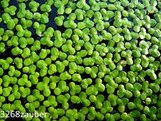
Ecological Importance
In the wild, duckweed is an important source of food for fish and waterfowl. Duckweed provides a habitat for certain types of frogs and fish. It also maintains the habitat by providing enough shade to keep the growth of oxygen-robbing algae down.
Problems
Duckweed multiplies rapidly. It may spread from pond to pond on the feathers of waterfowl. When duckweed completely covers a pond, it will block light from reaching other plants that live within the pond which in some cases leads to fish kills.
Duckweed may be a symptom of other pond problems such as high nutrient levels. Duckweed thrives in nitrogen-rich environments.
Common duckweed is a very small light green free-floating, seed bearing plant. Duckweed has 1 to 3 leaves, or fronds, of 1/16 to 1/8 inch in length. A single root (or root-hair) protrudes from each frond.
Giant or big duckweed is still relatively small (1/16 to 1/4 inch) with 1 to 4 leaves, or fronds, light green in color. Three or more roots (or root-hairs) protrude from each frond.
Duckweeds tend to grow in dense colonies in quiet water, undisturbed by wave action. Often more than one species of duckweed will be associated together in these colonies. All duckweed species can be aggressive invaders of ponds and are often found mixed in with other duckweeds, mosquito fern, and/or watermeal.
Hints to Identify
From a distance, duckweed is often mistaken for algae; it may form a thick, green blanket on the water surface. Duckweed is not interconnected, as is filamentous algae.
|
Homeowner Treatment Options
|
| Semera™ SC - 8 oz |
| Sonar AS |
| Sonar RTU |
| *Aquatic Biologists recommends implementing preventative management techniques and physical removal prior to, or in conjunction with treatment. |
Common Application Questions
Q. How much should I treat?
A. Full pond treatment is needed for effective control.
Q. When is the best time to treat?
A. Once water temperatures are around sixty degrees or warmer.
Q. How often do I need to treat Duckweed?
A. Many factors determine regrowth when it comes to duckweed and without knowing your site it is difficult to say. Generally speaking, multiple treatments (2 or more) may be needed.
Q. How long before I see results?
A. It really depends on the product you choose. For most vegetation, control will take approximately 2 weeks however, tissue damage may be evident within 2 to 4 days with liquid formulations. Some products are slower acting with results taking 30 days or more to achieve.
